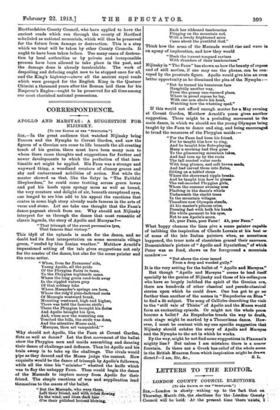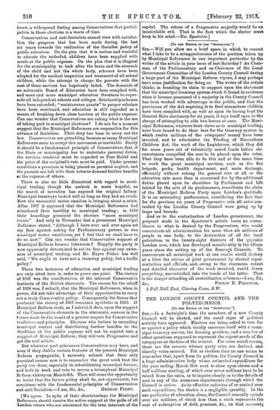LETTERS TO THE EDITOR.
LONDON COUNTY COUNCIL ELECTION&
[To TEE EDITOR OP THE " sreerrroa.~i - - §nt,—London is slowly• waking up to the fact that on Thursday, March- Gbh, the _eleetions for the London. County Council will be •held: At. the -present time "there 'exists; I
know, a widespread feeling among Conservatives that partici- pation in these elections is a waste of time.
Conservatives and anti-Socialists cannot view with satisfac- tion the progress that has been made during the last six years towards the realization of the Socialist policy of public education. On the plea that it is useless and wasteful to educate the underfed, children have been supplied with meals at the public expense. On the plea that it is illogical for the municipality to look after the brain and the stomach of the child and not the whole body, schemes have been adopted for the medical inspection and treatment of all school children, while the attempt to charge the parents with the cost of these services has hopelessly failed. The demands of an autocratic Board of Education have been complied with, and more and more municipal education threatens to super- sede all independent schools and colleges. Scholarship schemes have been extended; "maintenance grants" to pauper scholars have been continued, and education is still regarded as a means of breaking down class barriers at the public expense. Can one wonder that Conservatives are asking what is the use of taking part in municipal elections? I do not for a moment suggest that the Municipal Reformers are responsible for this advance of Socialism. Their duty has been to carry out the law. Conservatives are grumbling because so many Municipal Reformers seem to accept this movement as inevitable. Surely it should be a fundamental principle of Conservatism that, if the State or municipality has to undertake parental duties, the services rendered must be regarded as Poor Relief and the price of the recipient's vote must be paid. Under present conditions a premium is being placed on parental neglect, and the parents are left with their votes to demand further benefits at the expense of others.
There is also no little discontent with regard to muni- cipal trading, though the outlook is more hopeful, as the march of invention has exposed the original fallacy. Municipal tramways looked well so long as they had no rivals. Now the successful motor omnibus is bringing about a crisis. After 1907 it appeared that the Municipal Reformers had abandoned their hostility to municipal trading ; in 1910 their hoardings promised the electors "more municipal trams." And only in November last a prominent Municipal Reformer stated, "Although I have over and over again set my face against asking for Parliamentary powers to run municipal motor omnibuses, yet I feel that we shall have to do so now." Can one wonder that Conservative support of Municipal Reform became lukewarm P Happily the party is now apparently determined to set its face against any exten- sion of municipal trading, and Mr. Hayes Fisher has well said, " We ought to have not a tramway policy, but a traffic policy."
These two instances of education and municipal trading are only cited here in order to prove one point. The victory of 1907 was the manifestation of the inherent Conservative instincts of the British electorate. The reason for the rebuff of 1910 was, I submit, that the Municipal Reformers, when in power, did not take advantage of their opportunities to carry out a truly Conservative policy. Consequently the forces that produced the victory of 1907 remained apathetic in 1910. If Municipal Reform rests, as I submit it does, upon the support of the Conservative elements in the electorate, success in the future must be the result of a greater respect for Conservative traditions and principles. Electors who believe in extending municipal control and distributing further benefits to the thriftless at the public expense will not be cajoled into a support of Municipal Reform; they will vote Progressive and get the real article.
But whatever past grievances Conservatives may have, and even if they dislike certain features of the present Municipal Reform propaganda, I earnestly submit that their only practical course now is to remember the great work that the party has done, especially in rehabilitating municipal finance, and both to work and vote to secure a triumphant Municipal Reform victory on March 6th. Then will come the opportunity to insist that the future policy shall be, not opportunist, but consistent with the fundamental principles of Conservatism
and anti-Socialism.—I am, Sir, &c., GEORGE FLEET.
We agree. In spite of their shortcomings the Municipal Reformers should receive the active support at the polls of all London voter& who are concerned for the true interests of the
capital. The return of a Progressive majority would be an incalculable evil. That is the fact which the elector must keep in his mind.—En. Spectator.]















































 Previous page
Previous page